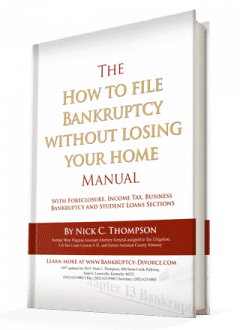Kentucky Limited Liability Corporations are Only an Asset of the Members, Not Business Assets
For tax purposes, the Limited Liability Company LLC is treated for financial reporting purposes similar to a proprietorship. The LLC offers the everyday small business the best of all worlds
- Control.
- No or Limited liability.
- Pass-through taxation.
However, in Bankruptcy, the Limited Liability Corporation is not a proprietorship. An LLC is merely an asset that belongs to the business owner of the LLC. An LLC acts like other corporations and shields the owners from personal liability. However, because members can bind the corporation, an LLC lacks continuity and transferability. The members generally cannot transfer their interests unless they solely own the company.
Using Chapter 13 to restructure the business
In Chapter 13, you don’t lose control of your small business. The assets are liquidated if a small business LLC files a Chapter 7 business bankruptcy. Only persons can file a Chapter 13 bankruptcy case, but the small business owner continues his operations during a Chapter 13 bankruptcy case. A small business must file a Chapter 11 if it needs to restructure. Most businesses that file a Chapter 11 end up as Chapter 7 in liquidation due to the high costs of Chapter 11 and the required financial reporting. If the business just has a single owner or a couple owns it, the owners can often file a Chapter 13, and restructure the business debts they are personally liable for in Chapter 13.
If the sole owner of a Limited Liability Corporation files for Bankruptcy, the company is just an asset of the sole owner. In Chapter 7, the business owner’s interest in the LLC transfers to the Chapter 7 Trustee in Bankruptcy. The Trustee can then sell the company or its assets. The LLC and the owner are separate legal entities.
What happens if there are multiple LLC members?
If there are multiple LLC members, the assets and the corporation, which is jointly owned, can generally not be touched by the Bankruptcy Trustee. One member cannot unilaterally dissolve and sell off an LLC when there are multiple members. The same rule applies to the Trustee, who could become the owner of an owner’s economic interest, but that interest may not have any benefit if there are multiple members. The Trustee is usually not allowed any governance or decision-making rights under state law for a multi-member LLC. However, some cases have allowed a Trustee to make some management decisions. In such scenarios, the liquidation of assets may lead to payments made to the business’s creditors.
If a Kentucky sole member limited liability corporation files a business bankruptcy, the individual owner did not file personal bankruptcy.
Some people and creditors believe that if the LLC files a bankruptcy, the person who solely owned the LLC has filed. That is just not the case. The LLC is a separate legal entity. Just because a single-member LLC filed for bankruptcy does not mean the owner has filed personal bankruptcy and or that he will lose his assets. Often, creditors will not pursue the owner of the LLC if the single-member LLC has filed for bankruptcy. Also, creditors often will not pursue the business if a small business owner files for personal bankruptcy.
Why is this important? Well, the individual member owns the corporation and its assets. Creditors may pursue personal assets to satisfy business debts if the small business owners sign personal guarantees. Just like sole proprietors are liable for the business debts, small business owners who agree to be personally liable for the debt are also liable.
If the LLC files a Chapter 7 or 11 bankruptcy, the corporation owner may have substantial assets and still keep their assets. If the person files Chapter 7, 13, or Chapter 11, the owner only keeps the exempted property an individual is allowed to keep to start over. In a Chapter 7 his solely owned corporation can be sold off. When an LLC files for Bankruptcy, it keeps none of its property unless the business continues operations under Chapter 11. When an LLC files as a Chapter 7, assets are also sold off, and operations usually cease. However, the owner is not part of an LLC bankruptcy case’s repayment plan or liquidation.
Why not file bankruptcy as a Chapter 11 business bankruptcy?
About 96% of all companies that file Chapter 11 eventually convert it to Chapter 7 and liquidate. LLCs and Corporations cannot file as a Chapter 13. Only consumers can file Chapter 13. Businesses can only file as a Chapter 7 or an 11. Almost all small businesses eventually fail in Chapter 11. This often results in significant business debt that impacts the company and its owners. Most cases are best filed as Chapter 7 for the business to manage business debts or Chapter 13 for the business owner.
The Uniform Limited Liability Company Act in 2006 had sections that helped expand the protections where the right to govern the business stayed in the control of the individual members, and most articles of incorporation limit and provide for anti-alienation and transfer of control. Well-drafted LLC agreements do not allow control to be alienated and taken over by a bankruptcy Trustee. Which is a reason not to use a young, low-cost lawyer to draft your LLC.
Conclusion for Kentucky limited liability corporations and bankruptcy.
Bankruptcy Trustees and Creditors can take charge of a member’s rights in a sole-member LLC by using a charging order. These charging orders act like any other lien on the property, and the charging order can transfer all of the company’s assets and control to a single member. It can also sell the interest of one member to another member in some cases. Or it can take over the distribution of the profits, which would have gone to that member like a paycheck is garnished.
The rights of a trustee are broad because the definition of assets of the estate is broad. Business assets are also included in this broad definition, impacting how they are managed during bankruptcy. When the individual files for bankruptcy, he transfers his governance rights and economic interests. If the LLC were a sole member of the LLC, he would hold all the LLC rights in the corporation. In a multi-member LLC, the articles control the LLC, and the articles almost always include how governing rights cannot be transferred. Generally, the members choose their partners and membership. That rarely includes a bankruptcy trustee as a business partner. If you are filing for bankruptcy with the Kentucky Bankruptcy Court for a small business, come see us.
Resources for Bankruptcy
Louisville Kentucky Bankruptcy Forms
How to Get Money Back from a Commissioner Foreclosure Sale
Bankruptcy Attorney Fees and Costs in Louisville, Kentucky
Bankruptcy For Limited Liability Companies – LLC Bankruptcy
School Student Loan Default College Liability
What Is Kentucky Higher Education Student Loan
If you are thinking about filing bankruptcy, don’t delay because timing is crucial. I am here to help you. So, contact my office right away to start the conversation. Nick C. Thompson, Bankruptcy Lawyer: 502-625-0905.

